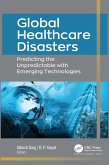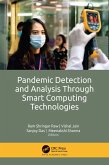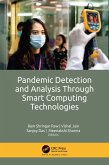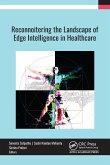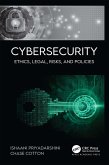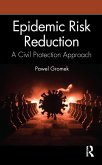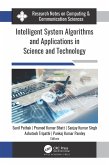Global Healthcare Disasters (eBook, ePUB)
Predicting the Unpredictable with Emerging Technologies
Redaktion: Garg, Adarsh; Goyal, D. P.
129,95 €
129,95 €
inkl. MwSt.
Sofort per Download lieferbar

65 °P sammeln
129,95 €
Als Download kaufen

129,95 €
inkl. MwSt.
Sofort per Download lieferbar

65 °P sammeln
Jetzt verschenken
Alle Infos zum eBook verschenken
129,95 €
inkl. MwSt.
Sofort per Download lieferbar
Alle Infos zum eBook verschenken

65 °P sammeln
Global Healthcare Disasters (eBook, ePUB)
Predicting the Unpredictable with Emerging Technologies
Redaktion: Garg, Adarsh; Goyal, D. P.
- Format: ePub
- Merkliste
- Auf die Merkliste
- Bewerten Bewerten
- Teilen
- Produkt teilen
- Produkterinnerung
- Produkterinnerung

Bitte loggen Sie sich zunächst in Ihr Kundenkonto ein oder registrieren Sie sich bei
bücher.de, um das eBook-Abo tolino select nutzen zu können.
Hier können Sie sich einloggen
Hier können Sie sich einloggen
Sie sind bereits eingeloggt. Klicken Sie auf 2. tolino select Abo, um fortzufahren.

Bitte loggen Sie sich zunächst in Ihr Kundenkonto ein oder registrieren Sie sich bei bücher.de, um das eBook-Abo tolino select nutzen zu können.
Discusses state-of-the-art technology for predicting disasters by designing healthcare disaster management systems that use modern technology-cloud computing, artificial intelligence, IoT, data analytics, machine learning-to increase effectiveness in remote sensing technologies, data analytics, data storage, GIS, GPS, etc.
- Geräte: eReader
- ohne Kopierschutz
- eBook Hilfe
- Größe: 13.65MB
Andere Kunden interessierten sich auch für
![Global Healthcare Disasters (eBook, PDF) Global Healthcare Disasters (eBook, PDF)]() Global Healthcare Disasters (eBook, PDF)129,95 €
Global Healthcare Disasters (eBook, PDF)129,95 €![Pandemic Detection and Analysis Through Smart Computing Technologies (eBook, ePUB) Pandemic Detection and Analysis Through Smart Computing Technologies (eBook, ePUB)]() Pandemic Detection and Analysis Through Smart Computing Technologies (eBook, ePUB)129,95 €
Pandemic Detection and Analysis Through Smart Computing Technologies (eBook, ePUB)129,95 €![Pandemic Detection and Analysis Through Smart Computing Technologies (eBook, PDF) Pandemic Detection and Analysis Through Smart Computing Technologies (eBook, PDF)]() Pandemic Detection and Analysis Through Smart Computing Technologies (eBook, PDF)129,95 €
Pandemic Detection and Analysis Through Smart Computing Technologies (eBook, PDF)129,95 €![Reconnoitering the Landscape of Edge Intelligence in Healthcare (eBook, ePUB) Reconnoitering the Landscape of Edge Intelligence in Healthcare (eBook, ePUB)]() Reconnoitering the Landscape of Edge Intelligence in Healthcare (eBook, ePUB)114,95 €
Reconnoitering the Landscape of Edge Intelligence in Healthcare (eBook, ePUB)114,95 €![Cybersecurity (eBook, ePUB) Cybersecurity (eBook, ePUB)]() Ishaani PriyadarshiniCybersecurity (eBook, ePUB)129,95 €
Ishaani PriyadarshiniCybersecurity (eBook, ePUB)129,95 €![Epidemic Risk Reduction (eBook, ePUB) Epidemic Risk Reduction (eBook, ePUB)]() Pawel GromekEpidemic Risk Reduction (eBook, ePUB)74,95 €
Pawel GromekEpidemic Risk Reduction (eBook, ePUB)74,95 €![Intelligent System Algorithms and Applications in Science and Technology (eBook, ePUB) Intelligent System Algorithms and Applications in Science and Technology (eBook, ePUB)]() Intelligent System Algorithms and Applications in Science and Technology (eBook, ePUB)145,95 €
Intelligent System Algorithms and Applications in Science and Technology (eBook, ePUB)145,95 €-
-
-
Discusses state-of-the-art technology for predicting disasters by designing healthcare disaster management systems that use modern technology-cloud computing, artificial intelligence, IoT, data analytics, machine learning-to increase effectiveness in remote sensing technologies, data analytics, data storage, GIS, GPS, etc.
Dieser Download kann aus rechtlichen Gründen nur mit Rechnungsadresse in A, B, BG, CY, CZ, D, DK, EW, E, FIN, F, GR, HR, H, IRL, I, LT, L, LR, M, NL, PL, P, R, S, SLO, SK ausgeliefert werden.
Produktdetails
- Produktdetails
- Verlag: Taylor & Francis eBooks
- Seitenzahl: 222
- Erscheinungstermin: 4. August 2022
- Englisch
- ISBN-13: 9781000572810
- Artikelnr.: 64115060
- Verlag: Taylor & Francis eBooks
- Seitenzahl: 222
- Erscheinungstermin: 4. August 2022
- Englisch
- ISBN-13: 9781000572810
- Artikelnr.: 64115060
- Herstellerkennzeichnung Die Herstellerinformationen sind derzeit nicht verfügbar.
Adarsh Garg, PhD, is currently Professor (IT and Analytics), GL Bajaj Institute of Management and Research, Greater Noida, India. She was formerly Professor at Galgotias University, Gautam Buddh Nagar, Greater Noida, India, and Visiting Professor at Delhi Technical University, Delhi, India. Prior to joining Galgotias University, she worked with organizations including WIPRO Tech, GE, IMT Ghaziabad, Punjabi University, and Patiala. She is currently supervising several PhD candidates. Dr. Garg has published over 50 research papers in refereed international/national journals and conference proceedings. She is a member of various professional bodies, including the Computer Society of India and the ACM-Computer Science Teachers' Association. She has 20 years of teaching, corporate, and research within the areas of her interest, which include business analytics, data mining, business intelligence, MIS, e-learning, and project management experience. D. P. Goyal, PhD, Director and Professor at the Indian Institute of Management, Shillong, India, and is also a visiting professor at Aarhus University, Denmark. Prior to joining IIM Shillong, he was Professor at MDI¿ Gurgaon, India. He has more than 32 years of corporate, teaching, and research experience to his credit. His teaching and research interest areas include IS value, IS strategy, MIS, e-government, and business process management. He has published over 100 research papers in refereed international/national journals and conference proceedings. He is a member of various professional bodies and is associated with many business schools and universities in the capacity of member of Board of Governors, Academic Council, Board of Studies, Academic Advisory Board, etc. He has been a consultant to the government of India for various assignments, and has authored almost 20 books, including textbooks on management information systems, IT project management, and enterprise resource planning.
1. Role of Knowledge Graphs in Analyzing Epidemics and Health Disasters 2.
Forecasting of COVID-19 with the ARIMA Model in India as a Preventive
Measure of Healthcare Catastrophe 3. Role of Artificial Intelligence in the
Era of COVID-19 to Improve Hospital Management 4. Challenges of Global
Healthcare Disasters 5. Healthcare Disaster Prediction with IoT, Data
Analytics, and Machine Learning 6. Effectiveness of Aarogya Setu Mobile
Application During COVID-19 Healthcare Management: A Technology Acceptance
Model-Based Approach 7. CoReS-Respiratory Strength Predicting Framework
Using Noninvasive Technology for Remote Monitoring During Heath Disasters
8. Exploring the Scope of Policy Issues Influencing IoT Health and Big
Data: A Structured Review 9. COVID-19 Disaster Healthcare Management System
in Rural Areas 10. Sentiment Analysis for Sustainable Healthcare During
Pandemic Outbreak: Lessons Learned from COVID-19 11. Design Schema to Offer
Security and Confidentiality to Healthcare Data in Cloud Environment
Forecasting of COVID-19 with the ARIMA Model in India as a Preventive
Measure of Healthcare Catastrophe 3. Role of Artificial Intelligence in the
Era of COVID-19 to Improve Hospital Management 4. Challenges of Global
Healthcare Disasters 5. Healthcare Disaster Prediction with IoT, Data
Analytics, and Machine Learning 6. Effectiveness of Aarogya Setu Mobile
Application During COVID-19 Healthcare Management: A Technology Acceptance
Model-Based Approach 7. CoReS-Respiratory Strength Predicting Framework
Using Noninvasive Technology for Remote Monitoring During Heath Disasters
8. Exploring the Scope of Policy Issues Influencing IoT Health and Big
Data: A Structured Review 9. COVID-19 Disaster Healthcare Management System
in Rural Areas 10. Sentiment Analysis for Sustainable Healthcare During
Pandemic Outbreak: Lessons Learned from COVID-19 11. Design Schema to Offer
Security and Confidentiality to Healthcare Data in Cloud Environment
1. Role of Knowledge Graphs in Analyzing Epidemics and Health Disasters 2.
Forecasting of COVID-19 with the ARIMA Model in India as a Preventive
Measure of Healthcare Catastrophe 3. Role of Artificial Intelligence in the
Era of COVID-19 to Improve Hospital Management 4. Challenges of Global
Healthcare Disasters 5. Healthcare Disaster Prediction with IoT, Data
Analytics, and Machine Learning 6. Effectiveness of Aarogya Setu Mobile
Application During COVID-19 Healthcare Management: A Technology Acceptance
Model-Based Approach 7. CoReS-Respiratory Strength Predicting Framework
Using Noninvasive Technology for Remote Monitoring During Heath Disasters
8. Exploring the Scope of Policy Issues Influencing IoT Health and Big
Data: A Structured Review 9. COVID-19 Disaster Healthcare Management System
in Rural Areas 10. Sentiment Analysis for Sustainable Healthcare During
Pandemic Outbreak: Lessons Learned from COVID-19 11. Design Schema to Offer
Security and Confidentiality to Healthcare Data in Cloud Environment
Forecasting of COVID-19 with the ARIMA Model in India as a Preventive
Measure of Healthcare Catastrophe 3. Role of Artificial Intelligence in the
Era of COVID-19 to Improve Hospital Management 4. Challenges of Global
Healthcare Disasters 5. Healthcare Disaster Prediction with IoT, Data
Analytics, and Machine Learning 6. Effectiveness of Aarogya Setu Mobile
Application During COVID-19 Healthcare Management: A Technology Acceptance
Model-Based Approach 7. CoReS-Respiratory Strength Predicting Framework
Using Noninvasive Technology for Remote Monitoring During Heath Disasters
8. Exploring the Scope of Policy Issues Influencing IoT Health and Big
Data: A Structured Review 9. COVID-19 Disaster Healthcare Management System
in Rural Areas 10. Sentiment Analysis for Sustainable Healthcare During
Pandemic Outbreak: Lessons Learned from COVID-19 11. Design Schema to Offer
Security and Confidentiality to Healthcare Data in Cloud Environment

